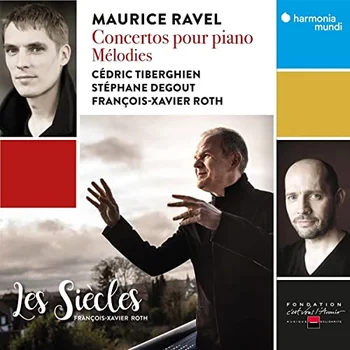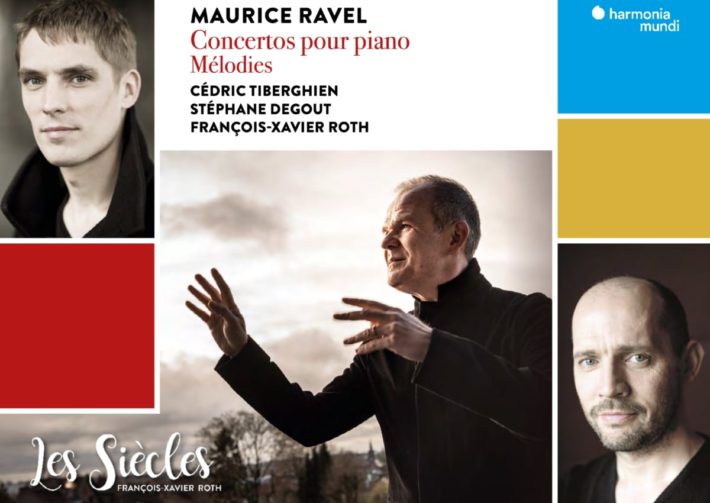Readers of The Classic Review are well familiar with François-Xavier Roth and Les Siècles’ exploration of the French Impressionism music series he has embarked on, playing instruments from the era. After well-received orchestral releases, he is joined here by pianist Céderic Tiberghien in Ravel‘s two exquisite Piano Concertos, one for the left hand alone. Instruments are from the 1890s to the 1930s, when the concertos were composed, and true to form, Tiberghien plays an 1892 Pleyel grand.

To say that Ravel’s Piano Concertos are well served on record is to put it mildly. Going through the catalog for comparisons, I was astonished by the sheer volume of excellent versions. Perhaps this is why Harmonia Mundi chose to present the concertos in this “historically informed” way, but the truth of the matter is that this is not the first time the Concerto For the Left Hand is recorded on period instruments – Clair Chevallier recorded it with Anime Eterna under Jos van Immerseel in 2006. But that recording kept the mysteriousness of this masterpiece, while this current recording is the most literal and non-atmospheric on record. The dramatic buildups in the orchestra are planned to the t without any sense of excitement, transitions are so neatly cut that all fluidity is lost (hear what is supposed to be a mesmerizing transition to the final cadenza at track 13, 14’04). Turn to Kristian Zimerman’s version with Boulez and the LSO, or to Leon Fleisher with the BSO and Ozawa and you’ll get a rush from unexpected climaxes. When the orchestra re-enters after the long solo at 4’40”, there’s a meticulously balanced ensemble playing, but it sounds as if the brass players don’t fully control their instruments’ intonation.
Tiberghien’s Pleyel doesn’t have the dynamic range of a modern grand, and it works best in the fast moments on both concertos, where lovely dialogues with the wind and brass can be clearly heard, yet in the slow sections (especially in the Concerto in G’s slow movement), the short decay made me yearn for a modern instrument. Where the ultra transparency does benefit the composition, is in this concerto’s third movement, where the fast dialogues sometimes get swallowed in other performances, especially in generous acoustics.
In 1934, Marguerite Long recorded the Concerto in G with hand-picked musicians from Paris, supposedly in the presence of the composer (crediting the composer as the conductor was later turned out to be dubious). It was only a few years after the debut and a lengthy European tour playing the work. The Left Hand Concerto’s dedicatee, Paul Wittgenstein, was recorded playing the work in the late 1950s. These two recordings are not the best representatives of the works or soloists, but are as “authentic” as can be. In fact, Long’s playing and some of the accompaniment are still wonderful to hear, even if the performance is not fully rehearsed and falls into inaccuracies here and there. I sincerely wish Mr. Tiberghien will give us a recording on a modern piano and orchestra, as the playing often shows promising ideas not fully realized on the old Pleyel.
Although can be seen as fillers, the songs performed between the concertos are superb. We have lovely renditions of “Don Quichotte à Dulcinée”, “Deux Mélodies hébraïques” and “Trois Poèmes de Stéphane Mallarmé”, all performed with diverse styles and pure dedication by baritone Stéphane Degout. Here Tiberghien’s accompaniment fully catches the intricate piano writing and complex dialogue between voice and piano.
Recommended Comparisons
Zimerman | Argerich | Chevallier | Fleisher
Ravel – Concertos pour piano, Mélodies
Céderic Tiberghien – Piano
Stéphane Degout – Baritone
Les Siècles
François-Xavier Roth – Conductor
Harmonia Mundi, CD HMM902612



















